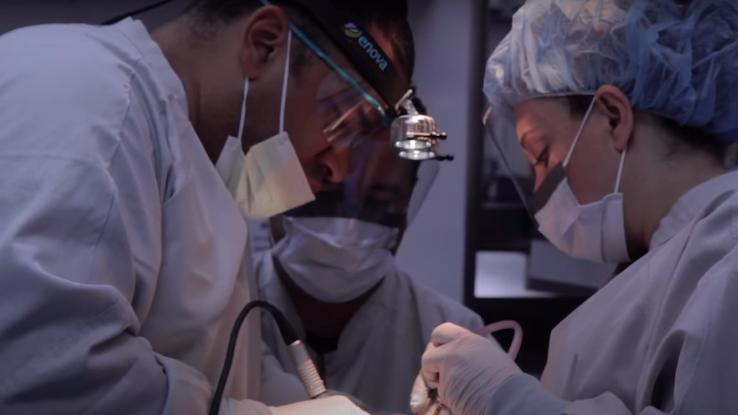
Your oral health isn’t just important for maintaining your great smile; it’s also an essential element of maintaining your overall health. In your lifetime you may have a condition or other issue with your teeth or mouth and need to have surgery to correct it. When you need oral surgery, you may be wondering whether or not Medicare will cover the costs of the procedure. The answer depends on a few different factors.
Regular Dental Care vs. Oral Surgery
Before learning about how Medicare coverage relates to oral surgery, it’s important to understand some distinctions in the types of oral care you may need. Routine, or “regular” dental care means you visit the dentist periodically — maybe every six months or so — for cleanings and checkups. At these appointments, your dentist takes X-ray images of your mouth to look for cracks, cavities and other oral issues. They also do screenings for oral cancer. During a cleaning, your dentist removes plaque and tartar from your teeth and polishes them, too. Routine dental appointments help you stay on top of your oral health and can help your dentist catch any potential issues early on, when they’re easier to treat.
In contrast, oral surgery describes any surgical procedure you have done in or around your mouth to treat an injury or disorder. You may only need one operation, or you may need to have a series of several to correct the issue you’re experiencing. This form of treatment is expected to cure or help heal the injury or disorder and is not ongoing like routine dental care.
Common oral surgery procedures include wisdom tooth removal, gum grafts, root canals and insertion of tooth implants. However, some common procedures like fillings, which your dentist can complete, are not oral surgery. Oral surgery is often beyond the scope of a regular dentist’s skill set, and you may need to visit a periodontist or other professional who specializes in oral surgery.
Medicare Coverage
Medicare is the U.S. federal government’s health insurance program that’s provided to all Americans over age 65, people of all ages who are disabled and people who have permanent kidney failure. Just as Medicare doesn’t cover most vision and hearing care, it also doesn’t cover routine dental care or procedures. According to the official website for Medicare, this form of health insurance “doesn’t cover most dental care, dental procedures or supplies,” such as fillings, tooth extractions, cleanings and dentures. Unless you have another form of dental insurance, you’ll pay 100% of the cost for these and some other non-covered services and supplies.
There are some situations in which Medicare pays for routine dental services. Medicare Part A, which covers inpatient care when you’re admitted to a hospital, covers some dental services that you receive while you’re already hospitalized. If you need to be hospitalized after an emergency dental procedure, Medicare Part A covers the cost of hospitalization even though it doesn’t cover the cost of the dental procedure itself. Medicare Part B may cover some of the costs of oral surgery that a doctor performs on an outpatient basis.
Having Medicare cover oral surgery is possible, but it isn’t as straightforward as simply receiving the surgery for any reason and having all the costs paid. For Medicare to cover oral surgery, the procedure must be deemed medically necessary. This means that the surgery must be required as part of a treatment plan for a health condition.
As an example, imagine that you have thyroid cancer. The treatment involves using radiation on your thyroid, which is in your neck, so the radiation therapy will be aimed at an area near your mouth. You also have a few damaged, diseased teeth. Before starting your radiation treatment, your doctor deems it medically necessary to have these damaged teeth removed because doing so can help prevent these and other bones in your head and jaw from dying due to the radiation. In this case, the oral surgery to remove the teeth is covered under Medicare because it’s ultimately a component of your treatment plan for thyroid cancer.
The Role of Medicare Part C
If you’re looking for coverage for routine dental care, you have a few options. The first is to purchase a traditional dental insurance plan and pay premiums for it every month. These plans are typically designed to cover all the costs of routine cleanings and exams and a portion of the costs of more involved procedures like fillings, crowns and bridges.
Another option is to choose a Medicare Part C plan, which is also called a Medicare Advantage plan. These are health insurance plans that are available through private insurance companies, so the federal government isn’t directly paying for your medical care. Instead, you get Medicare Part A and Part B coverage from a private insurer.
Although you’ll likely need to pay a premium if you opt for a Medicare Advantage plan, these policies often offer coverage that Original Medicare doesn’t. You may be able to find a plan that covers some routine dental care costs, in addition to oral surgery. Ask your dentist which Medicare Advantage plans they accept to get started in searching for one of these policies if you’re interested.
Resource Links:
https://www.ncbi.nlm.nih.gov/pubmed/31271082
https://www.cigna.com/individuals-families/health-wellness/what-is-oral-surgery
https://www.medicare.gov/coverage/dental-services
https://www.cms.gov/newsroom/fact-sheets/2020-medicare-parts-b-premiums-and-deductibles





